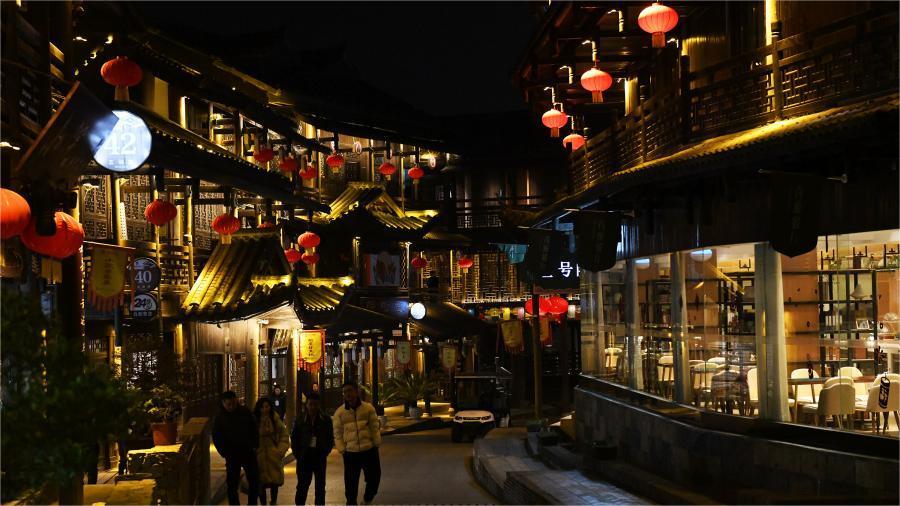Coffee beans bring prosperity to south China village
HAIKOU, March 1 (Xinhua) -- As Huang Xiuwu grinds coffee beans in his livestreaming studio, demonstrating the art of pour-over coffee, thousands of coffee enthusiasts watch online and make their orders.
In 2008, Huang returned to his hometown of Changxing Village in the Qiongzhong Li and Miao Autonomous County of south China's Hainan Province, where he later co-founded the Feipushan coffee company.
"By selling our homegrown coffee beans and products, our company now boasts an annual revenue of about 1 million yuan (140,774 U.S. dollars)," Huang said.
This success was not down to luck, but the result of Huang's unwavering dedication to reviving a fading tradition.
Hainan, the birthplace of many overseas Chinese, has a rich history of coffee cultivation and consumption. The habit of drinking coffee was brought to Hainan by overseas Chinese decades ago, and residents of Changxing Village were growing coffee as early as in the 1960s, thanks to their home's unique geographical advantages.
At a latitude of 18 degrees north and an altitude of over 200 meters, the village has an ideal environment for the growth of coffee beans. A significant difference in daytime and nighttime temperatures, optimal humidity, sunlight, rainfall, fertile soil and natural spring water all contribute to the high-quality coffee beans produced in Changxing Village.
However, when Huang first returned to the village, he witnessed the decline of local coffee cultivation due to the meager profits that were brought in by selling coffee beans alone -- raw materials in the coffee industry.
"After coming home, I learned coffee cultivation techniques and grew 50 mu (about 3.33 hectares) of coffee plants, and the income was good," Huang said. "Gradually, this attracted some locals to join me."
In 2013, Huang took the initiative to establish a coffee cooperative. He and the village officials distributed free coffee bean seedlings and provided hands-on instruction, encouraging more people to engage in coffee bean cultivation.
The increasing level of coffee production and growing profits sparked the local enthusiasm for coffee bean cultivation once again. "In 2008, the coffee bean cultivation area in our village was about 200 mu, and now it has expanded to about 1,500 mu," Huang said.
After establishing the cooperative, Huang realized that selling coffee products would be more profitable than selling whole coffee cherries, the fruit from which coffee beans are harvested.
"Coffee cherries fetch just 10 yuan per kilogram, but the same weight of processed coffee beans can sell for 180 yuan," he said.
He then introduced coffee processing equipment to the village and worked with locals to establish the Feipushan coffee company.
The Feipushan processing plant has provided jobs for locals, and the brand has increased the added value of local coffee products, bringing more economic benefits for the village. The plant also purchases most of its coffee cherries locally, which ensures stable incomes for locals, Huang said.
The company also produces various flavored coffee beans and products, which are available not only at stores in Hainan, but also in metropolises like Beijing and Shanghai, generating even more profits for locals.
In recent years, Hainan has implemented an action plan to develop a complete, high-efficiency tropical agriculture industrial chain, highlighting coffee as a key industry to promote its cultivation, processing and trade.
Huang is participating in short-video and livestreaming training provided by the local government, and he expects to gain the favor of more consumers by expanding the online market for Feipushan coffee.
"I spend about two or three hours almost every afternoon broadcasting live online, sharing brewing techniques and the features of our coffee beans," he said. "We now have about 4,000 followers, and our monthly online sales can reach about 12,000 yuan."
Huang intends to continue expanding local coffee production, developing his livestreaming work further to bring in more sales, and integrating the local coffee industry with tourism.
"I hope to build a coffee-themed guesthouse to help visitors experience the joys of coffee cultivation, picking and brewing. My goal is to help popularize Hainan's coffee culture and bring increased incomes for locals," he said.
Photos
Related Stories
- Coffee craze in China's "city of the future" brews up entrepreneurial spirit
- Chinese market boosting growth in Brazilian coffee exports
- China sets up microbial strain resource dataset for coffee fermentation
- Coffee-themed tours brewing interest in southwest China
- China's Yunnan brews pour-over coffee using novel technologies
Copyright © 2024 People's Daily Online. All Rights Reserved.









